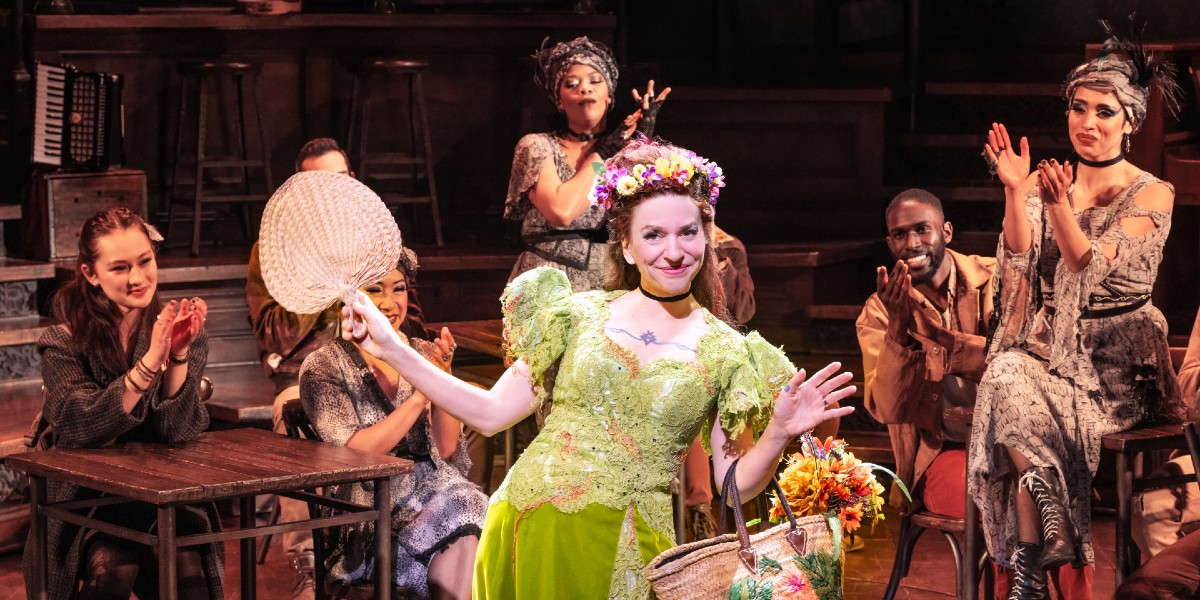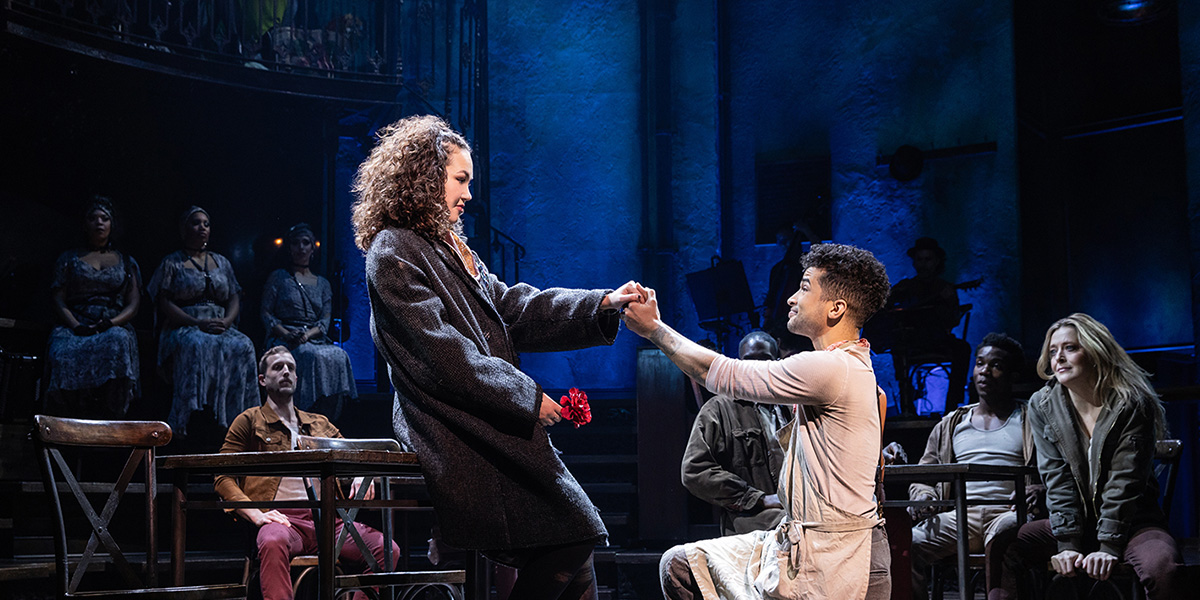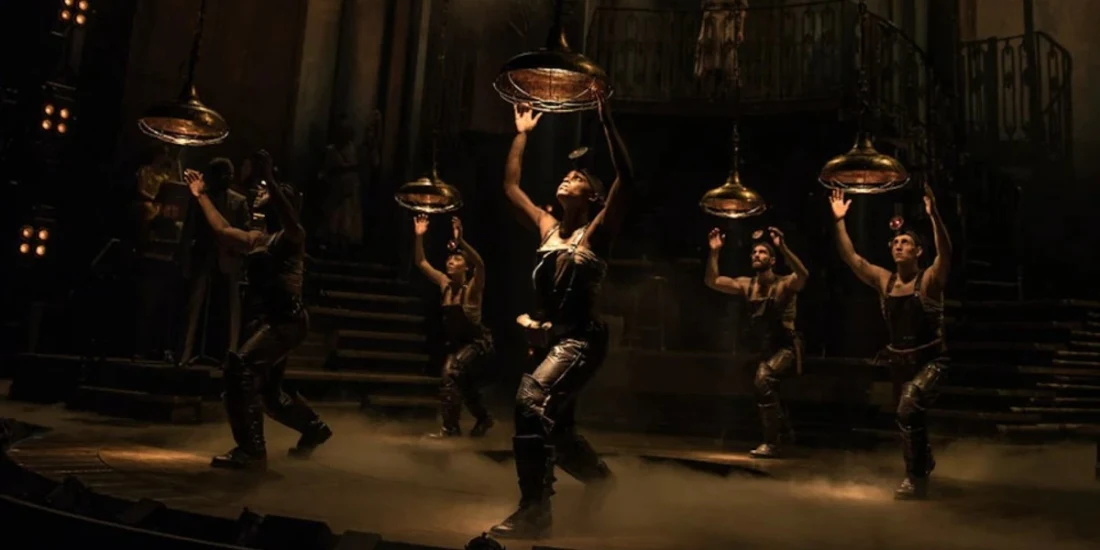What to know about Greek mythology before seeing 'Hadestown'
Find out where the contemporary musical borrows — and differs — from ancient classic stories.
Anaïs Mitchell first conceived Hadestown as a concept album based on classical Greek myths before turning the songs into a full-fledged musical. The basis remained intact: Two myths of troubled couples — Orpheus and Eurydice, and Hades and Persephone — are retold with jazz and folk music and placed in a contemporary industrial setting. Mitchell's interpretation, with plenty of creative liberty, uses the myths to talk about greed and unethical labor, but also the enduring power of love.
Geographically and thematically, the original source material couldn't be more different from Hadestown, but the characters' narratives and personalities draw from ancient Greek literature.
If you slept through your Greek mythology lesson in high school, you might get as lost during the musical as Orpheus does on the way to Hadestown. Brush up on your mythology knowledge with our guide, and then get ready to see these classical characters in a whole new light.
Get Hadestown tickets now.

Characters from Greek mythology in in Hadestown
Eight main characters from Greek mythology are featured as lead roles in Hadestown. They're all essentially human in the play, but in the original myths, more than half are all-powerful gods and goddesses. The rest have some sort of powers of their own too, like magnetic beauty and the ability to play enchanting music.
- Orpheus: A demigod, the son of Apollo, god of the sun and music, and the muse Kalliope. He inherited great musical skills from his parents — in Greek mythology, he can charm any living creature and even rocks with his music. Orpheus is featured in multiple Greek myths, including Jason and the Argonauts' quest to find the magical Golden Fleece (Orpheus was an Argonaut) and that of his own quest to rescue his late wife, Eurydice, from the underworld. He remains a lyre player in Hadestown, but a contemporary, poor one.
- Eurydice: In classical mythology, a beautiful wood nymph. She is killed by a snake shortly after marrying Orpheus and descends to the underworld. In Hadestown, Eurydice is an impoverished, lonely young girl who goes to the underworld (Hadestown) willingly, though she doesn't quite know what she's getting into.
- Hades: The god of the underworld, in both mythology and the musical. In some Greek stories, the name "Hades" is synonymous with the underworld itself. He is married to Persephone.
- Persephone: Persephone is the goddess of agriculture and vegetation and, after marrying Hades, becomes queen of the underworld by his side. She oversees the underworld (Hadestown) in the musical as well, but she's not happy about it.
- Hermes: Hermes is the messenger god, or the "herald of the gods," in Greek mythology. He is often depicted with winged shoes, representing his ability to deliver messages and move freely between the underworld and the world of the living. He takes on a Grim Reaper-esque role in mythology, guiding souls to the afterlife. He is the narrator of Hadestown and Orpheus's caretaker in the musical.
- The Fates: The three Fates are the Greek goddesses of (you guessed it) fate. The trio's job is to ensure that everyone lives out the destiny the Fates assign them. In mythology, the Fates look after a collection of strings, and each string represents someone's life. One Fate is the "spinner" who creates each person's life/thread, one is the "allotter" who measures each thread to determine a person's lifespan, and one is the "cutter" who cuts a person's thread when their life is at its end. In Hadestown, the three fates are a chorus, and they influence many decisions the other characters make.

Greek myths in Hadestown
Hadestown borrows most of its story from two myths about couples: Orpheus and Eurydice, and Hades and Persephone. These aren't fluffy rom-com romances — both couples go through their fair share of heartbreak. But both myths are epic love stories that have been told for centuries, and Anaïs Mitchell is just one of the latest people to tell them in a new way.
Orpheus and Eurydice
In the classical myth of Orpheus and Eurydice, the couple fall in love when Eurydice hears Orpheus playing his lyre and is entranced by his music and, therefore, him. Orpheus is likewise taken with Eurydice's beauty, and the two fall in love and get married. However, Hymen, the god of marriage who blessed their wedding, warns them their marriage won't last. Sure enough, one day in the woods, Eurydice steps on a snake that bites and kills her.
Orpheus becomes depressed without Eurydice and loses his love of music, so with the help of Apollo, he goes to the underworld to ask Hades to let Eurydice back up to the land of the living. He plays a song on his lyre to convince him, and everyone in the underworld is moved. Hades agrees to Orpheus's request on one condition: that Orpheus can't look back at Eurydice the entire time they're going back up. They almost make it, but Orpheus reaches the land of the living just before her, and he looks back at her while she is still in the underworld. Some versions of the myth say he looked back out of excitement, thinking she was there; others say he looked back because he doubted whether she made it. Eurydice descends back down for good, and Orpheus loses her.
Hades and Persephone
The story of Persephone was invented to explain the changing seasons. As the most popular version of the myth goes, Persephone was alone picking flowers in a field when Hades, on a rare trip away from the underworld, sees and falls for her. He steals her from the land of the living and brings her to the underworld to be his bride. When her mother, the agriculture goddess Demeter, finds out, she tries to bring Persephone back. However, by that time, Persephone has already eaten the fruit of the underworld (pomegranate seeds), which means she's stuck in the underworld with Hades and can't leave.
Eventually, Demeter makes a deal with Hades: Persephone will live with her for half the year and with Hades for the other half. In mythology, the bright and sunny spring and summer represent the time when Persephone and her mother are united above ground and happy. The chilly, bleak fall and winter are the seasons when Persephone is in the underworld.
In another version of the myth, which has become more popular lately, Hades doesn't kidnap Persephone. Rather, she willingly chooses to marry Hades and rule the underworld, and that's why she refuses to return to Demeter. In the musical, like in the first version of the story, Persephone isn't happy to be in Hadestown — in fact, he built it to keep her with him, but she feels trapped. Hermes and Orpheus recap the myth in the songs "Epic I" and "Epic III."

Changes to Greek mythology in Hadestown
One of the most major changes from Greek mythology is the setting. The myths take place in a mystic version of Greece, in which the gods' dwelling (Mount Olympus) and the underworld are not just concepts, but places people can travel to. (Not that it's the easiest journey, as Orpheus could tell you.) Hadestown places the myths fully on Earth. Anaïs Mitchell reimagines the titular underworld as an underground sweatshop, and the way to get there is a Hadestown-bound railroad track called "the road to hell." Orpheus, since he's essentially sneaking into the underworld, takes an even more dangerous path parallel to the track.
The characters, too, become types of people we could run into in our own lives. Orpheus is described as a legendary musician (and the son of a muse, but not in a godly context). Eurydice is simply "a hungry young girl." Hades and Persephone are still called gods, but not in a reverent way. Hades especially is a "god" in the way a greedy billionaire may be: He doesn't have otherwordly abilities, but he has absolute power over the factory workers in Hadestown, and he exploits it.
The Fates talk to the other characters and influence their decisions, but they don't control them. Hermes is perhaps the closest to mythic godliness: His character is described as a god besides being an all-knowing narrator, and he's also portrayed as a Hoodoo deal-broker inspired by African spirituality. But ultimately, he is a wise old member of Orpheus's poor community in Hadestown.
Other elements of the show take liberties from the original myths: The countless dead, forgotten souls in the mythological afterlife are the monolithic, soulless workforce of Hadestown, and Persephone runs a speakeasy for them to escape Hades and the factory that she doesn't want to be in, either. And of course, the music is a departure from Greek mythology: Hadestown is set to modern folk and jazz music, both of which are thousands of years younger than ancient Greek tunes.

Greek mythology references in Hadestown songs
Of course, the entirety of Hadestown is a 2.5-hour-long Greek mythology reference. But there are some songs that reference little details from the original myths that didn't make it into Hadestown's plot. Listen for them at the show!
"The River Styx is a river of stones / And Hades lays them high and thick" from "Epic II."
In Greek mythology, the River Styx is a passageway to the underworld, and only deceased people who pay a fare can travel it with the help of the ferryman Charon. In Hadestown, the River Styx is a wall that separates Hadestown from the rest of the world; his laborers continually build it up. The song "Nothing Changes" also mentions a river: The Fates say that your fate is your fate and ends in death, and it's just "the way the river runs," just like the River Styx literally flows toward death. Chilling!
"See how the vipers and vultures surround you / And they'll take you down, they'll pick you clean."
Hades sings this line to Eurydice when trying to convince her to go to Hadestown with him. In the original Greek myth, it is a venomous snake — a viper — that kills her and sends her to the underworld, and the lyric is inspired by that fate. You may notice that in the intro to the next song, "When the Chips Are Down," Hermes makes a similar reference: He describes Eurydice's standoff with Hades as a conflict of "songbird vs. rattlesnake."
"Hound dogs howling 'round the gate / Those dogs'll lay down and play dead / If you got the bones, if you got the bread."
Hermes describes guard dogs outside Hadestown in "Wait For Me." In mythology, the underworld is guarded by Hades's monstrous three-headed dog, Cerberus, and Orpheus got past the creature by lulling it to sleep with his lyre. Then, in "Wait For Me (Reprise)," Hermes sings: "The meanest dog you'll ever meet / He ain't the hound dog in the street / He bares some teeth and tears some skin / But brother, that's the worst of him." According to mythology and Mitchell, even hellish guard dogs get a lot nicer if you offer them a treat.
Get Hadestown tickets now.
Photo credit: Hadestown on Broadway. (Photos by Matthew Murphy)
Originally published on
